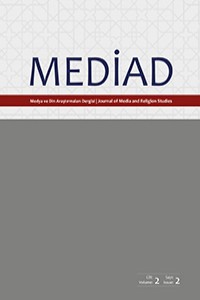Öz
Anahtar Kelimeler
Kaynakça
- Arvidsson, A. ve Delfanti, A. (2019). Introduction to digital media. New Jersey: John Wiley&Sons Inc.
- Baudrillard, J. (2005). Simülakrlar ve simülasyon. (çev. Oğuz Adanır), Ankara: Doğubatı Yayınları.
- Bellar, W. R., Cho, K. J. ve dğr. (2018). The intersection of religion and Mobile technology. İçinde Mehdi Khosrow-Pour (Ed.), Encyclopedia of Information Science & Technology, PA: IGI Global, 6161-6170.
- Campbell, A. H. (2013). Introduction: The rise of the study of digital religion. İçinde Heidi A. Campbell (Ed.), Digital Religion: Understanding Religious Practice in New Media, London: Rautledge, 1-22.
- Campbell, A. H. ve dğr. (2014). There’s a religious app for that! A framework for studying religious mobile applications. Mobile Media & Communication, 2(2), 154–172.
- Carey, J. W. (1992). Communication as culture: Essays on media and society. New York: Routledge.
- Castells, M. (2006). Enformasyon çağı: Ekonomi, toplum ve kültür. Birinci Cilt: Ağ Toplumunun Yükselişi, (Çev. Ebru Kılıç), İstanbul: İstanbul Bilgi Üniversitesi Yayınları.
- Dereli, M. D. (2019). Dinî kimliklerin siber uzamda akışkanlaşması. İnsan &Toplum, 9(1), 85-115.
- Grimes, R. (2002). Ritual and the media. Practicing Religion in the Age of The Media: Explorations in Media, Religion and Culture, İçinde Stewart Hoover and Lynn Schofield Clark (Ed.), New York: Columbia University Press, 219-234.
- Grieve, G. P. (2013). Digital religion, İçinde Heidi Campbell (Ed.), Digital Religion: Understanding Religious Practice in New Media Worlds. New York: Routledge, 104-118.
- Haberli, M. (2014). Sanal din: Tarihsel, kuramsal ve pratik boyutlarıyla internet ve din. İstanbul: Açılımkitap.
- Helland, C. (2000). Online-Religion/Religion-Online and virtual communitas. İçinde Hadden, J.K.-D.E. Cowan (Ed.), Religion on the Internet: Research Prospects and Promises, London: JAI Press/Elsevier Science, 205-233.
- Hoover, S. ve Echchaibi, N. (2014). Media theory and the third Spaces of digital religion. The Center for Media, Religion, and Culture, Boulder, CO: University of Colorado, 1-35.
- Hutchings, T. (2015). E-Reading and the Christian Bible. Studies in Religion/Sciences Religieuses, 44(4), 423-440.
- Kafalı, H. (2019). Yapay zekâ, toplum ve dinin geleceği. Ondokuz Mayıs Üniversitesi İlahiyat Fakültesi Dergisi, sayı: 46, 145-172.
- Mcluhan, M. (2001). The medium is the message: An inventory of effects. California: Gingko Press.
- https://thirdspacesblog.files.wordpress.com/2014/05/third-spaces-and-mediatheoryessay-2-0.pdf Erişim: 12 Şubat 2019.
Öz
Anahtar Kelimeler
Digitalization Internet Mobile Communication Technologies Digital Religion Piety
Kaynakça
- Arvidsson, A. ve Delfanti, A. (2019). Introduction to digital media. New Jersey: John Wiley&Sons Inc.
- Baudrillard, J. (2005). Simülakrlar ve simülasyon. (çev. Oğuz Adanır), Ankara: Doğubatı Yayınları.
- Bellar, W. R., Cho, K. J. ve dğr. (2018). The intersection of religion and Mobile technology. İçinde Mehdi Khosrow-Pour (Ed.), Encyclopedia of Information Science & Technology, PA: IGI Global, 6161-6170.
- Campbell, A. H. (2013). Introduction: The rise of the study of digital religion. İçinde Heidi A. Campbell (Ed.), Digital Religion: Understanding Religious Practice in New Media, London: Rautledge, 1-22.
- Campbell, A. H. ve dğr. (2014). There’s a religious app for that! A framework for studying religious mobile applications. Mobile Media & Communication, 2(2), 154–172.
- Carey, J. W. (1992). Communication as culture: Essays on media and society. New York: Routledge.
- Castells, M. (2006). Enformasyon çağı: Ekonomi, toplum ve kültür. Birinci Cilt: Ağ Toplumunun Yükselişi, (Çev. Ebru Kılıç), İstanbul: İstanbul Bilgi Üniversitesi Yayınları.
- Dereli, M. D. (2019). Dinî kimliklerin siber uzamda akışkanlaşması. İnsan &Toplum, 9(1), 85-115.
- Grimes, R. (2002). Ritual and the media. Practicing Religion in the Age of The Media: Explorations in Media, Religion and Culture, İçinde Stewart Hoover and Lynn Schofield Clark (Ed.), New York: Columbia University Press, 219-234.
- Grieve, G. P. (2013). Digital religion, İçinde Heidi Campbell (Ed.), Digital Religion: Understanding Religious Practice in New Media Worlds. New York: Routledge, 104-118.
- Haberli, M. (2014). Sanal din: Tarihsel, kuramsal ve pratik boyutlarıyla internet ve din. İstanbul: Açılımkitap.
- Helland, C. (2000). Online-Religion/Religion-Online and virtual communitas. İçinde Hadden, J.K.-D.E. Cowan (Ed.), Religion on the Internet: Research Prospects and Promises, London: JAI Press/Elsevier Science, 205-233.
- Hoover, S. ve Echchaibi, N. (2014). Media theory and the third Spaces of digital religion. The Center for Media, Religion, and Culture, Boulder, CO: University of Colorado, 1-35.
- Hutchings, T. (2015). E-Reading and the Christian Bible. Studies in Religion/Sciences Religieuses, 44(4), 423-440.
- Kafalı, H. (2019). Yapay zekâ, toplum ve dinin geleceği. Ondokuz Mayıs Üniversitesi İlahiyat Fakültesi Dergisi, sayı: 46, 145-172.
- Mcluhan, M. (2001). The medium is the message: An inventory of effects. California: Gingko Press.
- https://thirdspacesblog.files.wordpress.com/2014/05/third-spaces-and-mediatheoryessay-2-0.pdf Erişim: 12 Şubat 2019.
Ayrıntılar
| Birincil Dil | Türkçe |
|---|---|
| Konular | İletişim ve Medya Çalışmaları, Sosyoloji, Din Araştırmaları |
| Bölüm | Araştırma Makaleleri |
| Yazarlar | |
| Yayımlanma Tarihi | 31 Aralık 2019 |
| Yayımlandığı Sayı | Yıl 2019 Cilt: 2 Sayı: 2 |
 MEDYA VE DİN ARAŞTIRMALARI DERGİSİ (MEDİAD) - JOURNAL OF MEDIA AND RELIGION STUDIES
MEDYA VE DİN ARAŞTIRMALARI DERGİSİ (MEDİAD) - JOURNAL OF MEDIA AND RELIGION STUDIES
This journal is licensed under a Creative Commons Attribution 4.0 International License.


